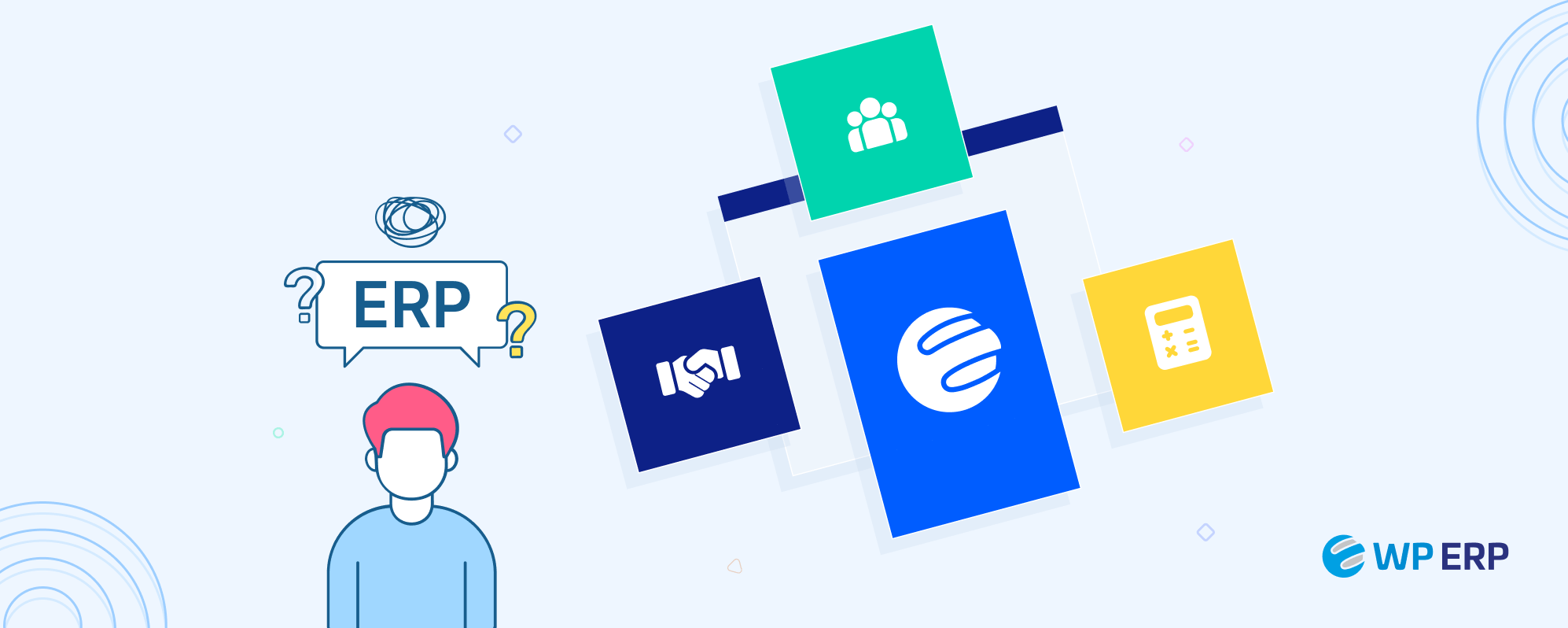ERP- Enterprise Resource Planning makes it easier to manage and integrate a business’s core processes by using software and technologies. It automates key business components like Human Resource Management, Finance & Accounting, Customer Services, and other day-to-day activities. ERP software reduces the manual workload of the company as a whole and accelerates its workflow to a great extent.
But a good number of people are deprived of these functionalities because of the myths and misconceptions built around ERP. One of the most common ERP myths – it is only for larger companies. That’s not true, obviously.
In this article, we’ve dispelled such common misconceptions about ERP in order to guide you to use ERP software to automate core business processes. Keep reading to debunk the common ERP myths with us and find excellent ways to simplify your business experience with WP ERP.
10+ Common Myths About ERP Software

ERP software is improving the productivity and efficiency of the businesses that use it. Various research and studies speak of the efficiency of ERP solutions in an organizational environment.
Organizations are achieving their goals through ERP solutions, such as operational efficiency (96.6%), reporting and visibility (85.7%), updating their technology stacks (80%), and increasing competitiveness and growth (68.4%).
Panorama Consulting Group, 2021
So, it’s evident that ERP is helpful for your organization. All you need to do is ignore the common ERP mistakes and choose the right tool that can serve your purposes. The following sections dispel all common ERP myths and unveil the truth about them.
1. ERP Systems Are Not Affordable
The cost of ERP systems varies depending on many factors like the number of employees you’re managing, and the number of modules, extensions, and features you’re using. So, it’s not always true that ERP systems are expensive. You can choose a suitable ERP tool that aligns with your budget and business needs at the same time.
Moreover, an effective ERP system saves a lot of working hours. It also reduces the chance of human error to almost zero. These things have a monetary value that can be added to the price of the ERP system. If you consider the outcomes of using ERP software, it is not too much expensive as most people think.
2. Pre-made ERP Systems Are Bad
A large number of people believe that building a custom ERP solution is better than buying already available ERP software. They rarely realize that custom ERP tools involve higher development costs and require highly experienced developers in the team. And you will face serious problems when any of the members of the core development team leaves your company.
On the other hand, you will get continuous support from the ERP solution provider if you buy their product. So, technically, readymade ERP systems are more affordable and hassle-free.
3. Only Larger Companies Benefit from ERP

ERP systems are only for larger organizations- this is one of the most exercised misconceptions about ERP. Yes, there was a time when only bigshots with substantial investments could afford to integrate automation into their business processes and reap the amazing ERP benefits. With the advancement and availability of modern technology, ERP solutions are now affordable even for smaller companies.
Since you can choose a personalized plan, you can pay as you go. That means if you have 15 employees, you can choose a plan that works for only 15 users and charges less. You’ll have to pay more for more users. Thus, ERP solutions can help businesses of any size.
4. ERP Is Suitable for Certain Teams
Some people think ERP is meant to benefit only certain teams like the HR department and CS department. In reality, ERP has the potential to help you manage every team in your company. All you need to do is implement it the right way. Integrate the same central system for each relevant department. ERP can work as the only management hub across all teams.
5. Support is an Additional Thing
Almost all paid ERP software comes with a responsive support team. But, some ERP users tend to go for the free version of the software, considering support as a secondary option. Their idea is right but only for the short-term. You may face issues while using the software in the long run. So, it’s wise to think long-term and buy the pro version to avail uninterrupted support feature.
6. Personalization Is Difficult
You can choose extensions and modules that are necessary for your business. Take WP ERP as an example. We have multiple extensions under our HRM module. You can pick the one you need and pay only for that. We have more useful extensions under other modules like CRM, Accounting, and Project Management. You have the liberty to select or omit any of the extensions. So, personalization is difficult- this is surely a myth.

7. Implementation Needs External Workforce
It’s really an advantage to have IT professionals inside the organizations. But, it’s not mandatory in most cases. Anyone with standard computer knowledge can configure ERP software with ease. Moreover, your ERP solution provider should provide all required documentation and technical support during the implementation phase. Even most vendors let users test a trial version before final deployment.
You should choose a competent partner who agrees to assist in the ERP implementation process. If you get support from the vendor, you won’t need an external workforce to integrate an ERP system into your business and manage the processes smoothly.
8. ERP, MRP, SCM & CRM- All Are the Same
Manufacturing resource planning (MRP), supply chain management (SCM), and customer relationship management (CRM) are all different from ERP. But, an ERP solution can integrate the centralized system with other tools that support MRP, SCM, CRM, or any other management tool. For example, WP ERP has core ERP features along with CRM, Accounting, and HRM extensions.
9. Takes Longer to Come into Effect

Old ERP systems used to take significant time to reach a working level. But, modern ERP solutions are easy to set up and become ready right away. Since most of the ERP solutions are now cloud-based or SaaS, they will start working as soon as you provide the necessary data. The only prerequisite is a fast internet connection.
10. ERP Is to Impress Your Customers
When you implement an ERP system into the business, it streamlines all your business operations. It ultimately contributes to increasing customer satisfaction. But the primary goal of using ERP software is not to impress customers. In fact, it focuses mainly on managing internal business processes. Some ERP tools work hand in hand with Customer Relationship Management, in that case, the use of ERP involves customers directly.
11. ERP ‘does everything’ for You
No tool can do everything for you. ERP systems only facilitate the business management process. You need to have smart people at the office who can use the tool and provide information to the system when necessary. For example, WP ERP has everything to Streamline Complex Business Activities. But you need to know how to use the resources it offers.
Learn how to use WP ERP from this use case ➡ How weDevs is Using WP ERP.
WP ERP for Small to Medium Companies

Every small or medium organization finds it difficult to manage all their employees, keep track of revenues and expenses, and provide customer support. That’s where WP ERP comes to the rescue for WordPress users. It is one of the leading plugins that have the three most needed modules to manage a business smoothly. Three modules are as follows:
- WP ERP HR
- WordPress CRM
- WordPress Accounting.
Each module comes with essential extensions that offer great functionalities for WordPress users who are looking for ERP software. Read the following section to know more about the modules and extensions of WP ERP features.
Supercharge Your Business with 30+ Modules & Extensions
The core ERP plugin is free with basic HR, CRM, and Accounting modules. But, you need to upgrade to the pro version to get additional and customizable modules depending on your needs. Let’s find out how the three ERP modules can help your business grow.
WordPress HR Plugin: WP ERP offers a simple and straightforward employee management tool to manage the various functions of the HR department. With WP ERP, you can see employee details, leave requests, employment history, performance logs, company-wide announcements, and more!
This HR module has 12 extensions to enable all the HR functionalities from your WordPress dashboard.
Know details from here ➡ WP ERP HR Extensions.

WordPress CRM: Now you can track and follow up on customers’ queries efficiently using WordPress CRM. It has made building sustainable relationships with your customers easier. You can prioritize users based on life stages and respond to important customers urgently. WordPress CRM also has an in-built email communication tool to facilitate your work process.
This CRM module has 13 integrations and extensions to take customer relationship management to the next level.
Know details from here ➡ WP ERP CRM Extensions.
WordPress Accounting for Non-Accountants: Accounting is quite intimidating to people with no business background. WP ERP introduced a module to enable non-accountants to understand and manage trial balances, income statements, ledger reports, debits, credits, and more. You can even make data-based decisions after analyzing the graphical interface.
This Accounting module has 7 extensions to help you manage account receivables, account payables, bank balance, and overall income and expense.
Know details from here ➡ WP ERP Accounting Extensions.
Simplify Your Experience with WP ERP
We’ve debunked the common ERP myths and misconceptions throughout this article and explained how WP ERP can help manage your business processes. Now, it’s your turn to decide if you want to ignore these misconceptions and start using an ERP system. If you run a WordPress website, WP ERP has the potential to simplify your experience while handling complex management activities.
You can subscribe to our newsletter to stay updated on exclusive ERP and WordPress-related content.












